Webinars & Events
Webinars & Events
Webinars
Let us help you succeed. Broaden your clinical laboratory knowledge with our educational webinars. Start by choosing your Human Condition to see available content.
- Gastrointestinal Calprotectin H. pylori E. coli Campylobacter
- Healthcare Acquired Infections C. difficile
- Pediatric & Neonatal CMV Group B Strep
- Respiratory Pertussis Group A Streptococcus
- Sexual Health HSV 1&2

Who, how and when to test for H. pylori infection
Join Meridian Bioscience for an exclusive, expert-led webinar on the updated 2024 American College of Gastroenterology (ACG) clinical practice guidelines for H. pylori. In this session, renowned gastroenterologists Dr. Steven F. Moss (Brown University) and Dr. Colin W. Howden (University of Tennessee) will guide participants through the latest recommendations on who, how, and when to test for H. pylori infections. The session will explore the prevalence of the infection, key disease associations, and the most up-to-date non-invasive testing methods. Attendees will also gain insights into the newest treatment protocols, emphasizing the importance of a Test-Treat-Retest approach for optimal patient outcomes.
Event Details
Date: November 12th
Time: 1:00 pm EST
Learning Objectives
- Understand the current epidemiology of H. pylori infections, including prevalence and risk factors.
- Recognize the disease associations of H. pylori and the potential long-term risks if left untreated.
- Identify the updated ACG 2024 guidelines on who should be tested for H. pylori, with a focus on high-risk populations.
- Review non-invasive testing methods and updated treatment protocols, including the importance of universal re-testing after treatment.
- Explore strategies for managing treatment failures and antibiotic resistance in H. pylori therapy.
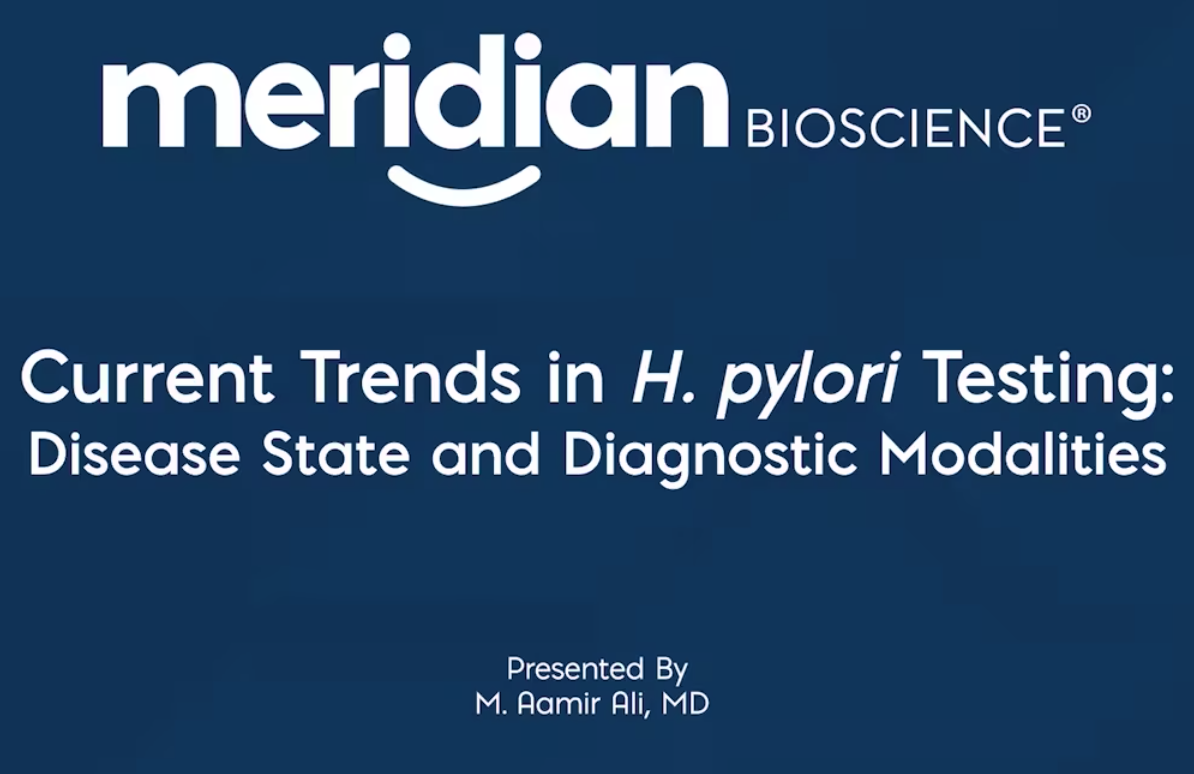
Current Trends in H. pylori Testing: Disease State and Diagnostic Modalities
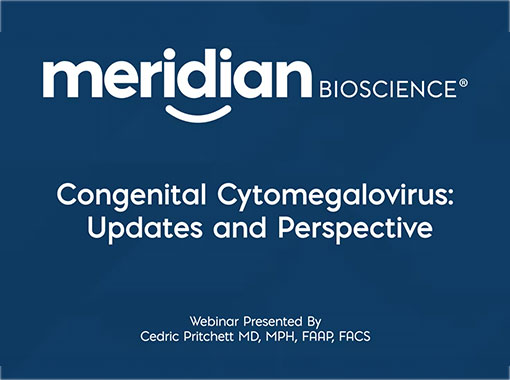
Congenital Cytomegalovirus: Updates and Perspective

Streptocoque B : Enjeux et Intérêts du Diagnostic Moléculaire Intrapartum
Malgré la stratégie de dépistage universel entre la 35 et 37ème semaine de grossesse, le streptocoque du groupe B (SGB) reste la cause majeure de méningite et de sepsis néonatal précoce. Un groupe d’experts Européens à recommandé un déplacement du dépistage à l’accouchement avec un test PCR rapide.
2 expertes des CNR France et Belgique discuteront des différents défis du diagnostic du SGB, de l’intérêt du dépistage intrapartum et des résultats d’une étude multicentrique portant sur le dépistage intrapartum à l’aide du test rapide moléculaire Revogene® GBS DS (Meridian Bioscience).
Dr Asmaa Tazi : MCU-PH laboratoire de bactériologie de l’Hôpital Cochin – APHP / CNR Français des Streptocoques
Cécile Meex : Ph.Biol. Service de microbiologie Clinique du CHU Liège / CNR Belge Streptococcus agalactiae
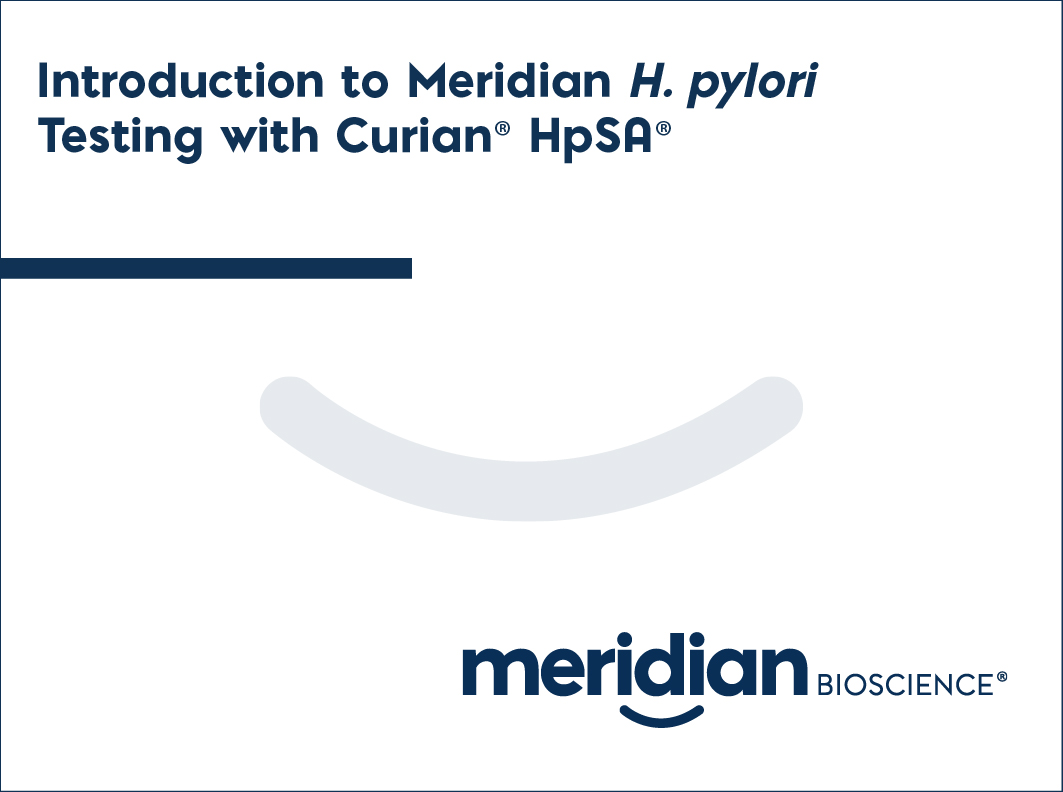
Introduction to Meridian Bioscience H. pylori Testing with Curian® HpSA®
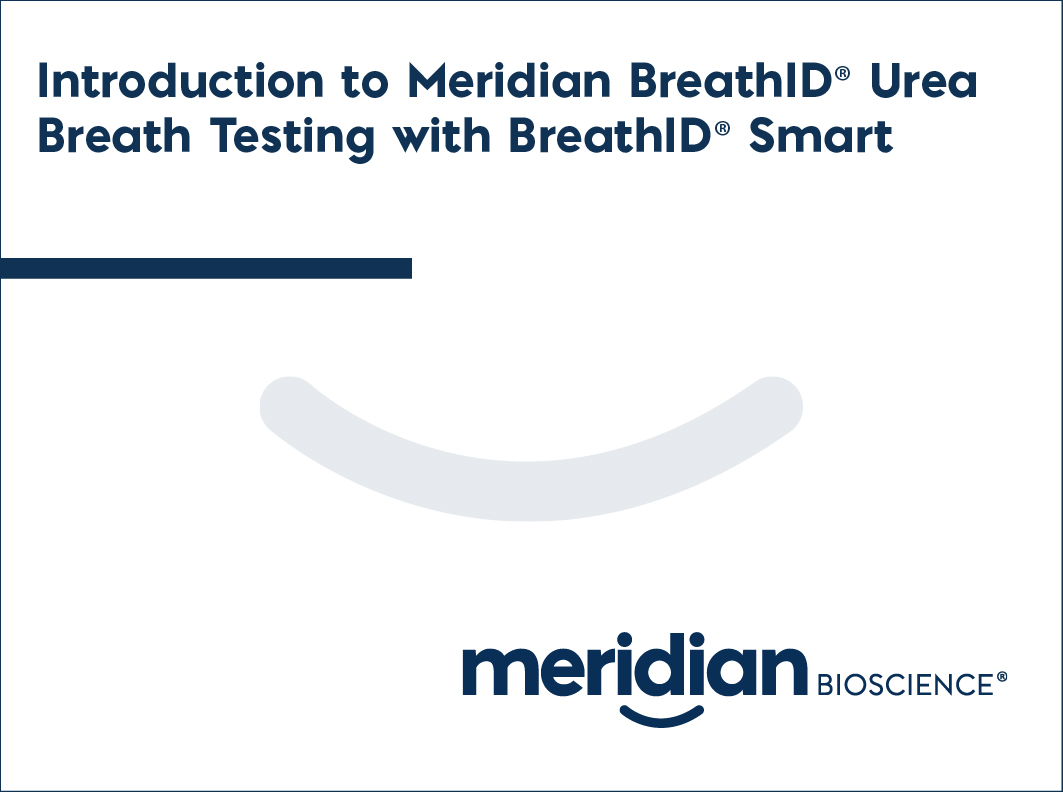
Introduction to Meridian Bioscience BreathID® Urea Breath Testing with BreathID® Smart®
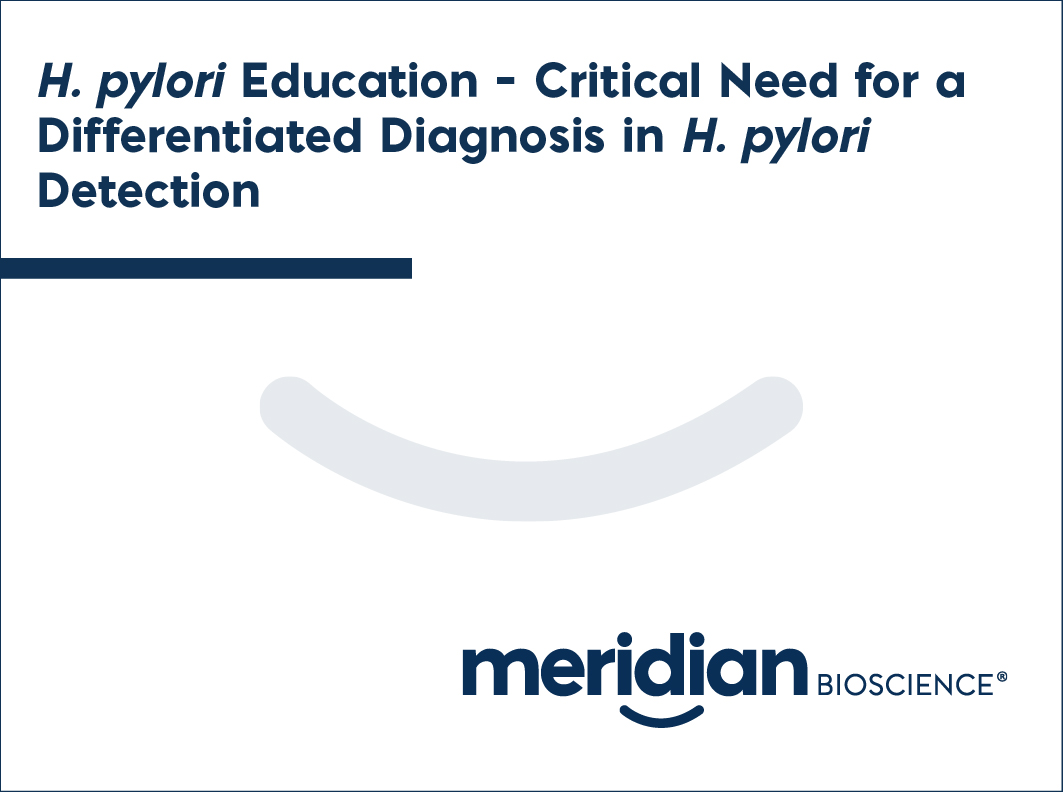
H. pylori Education – Critical Need for a Differentiated Diagnosis in H. pylori Detection
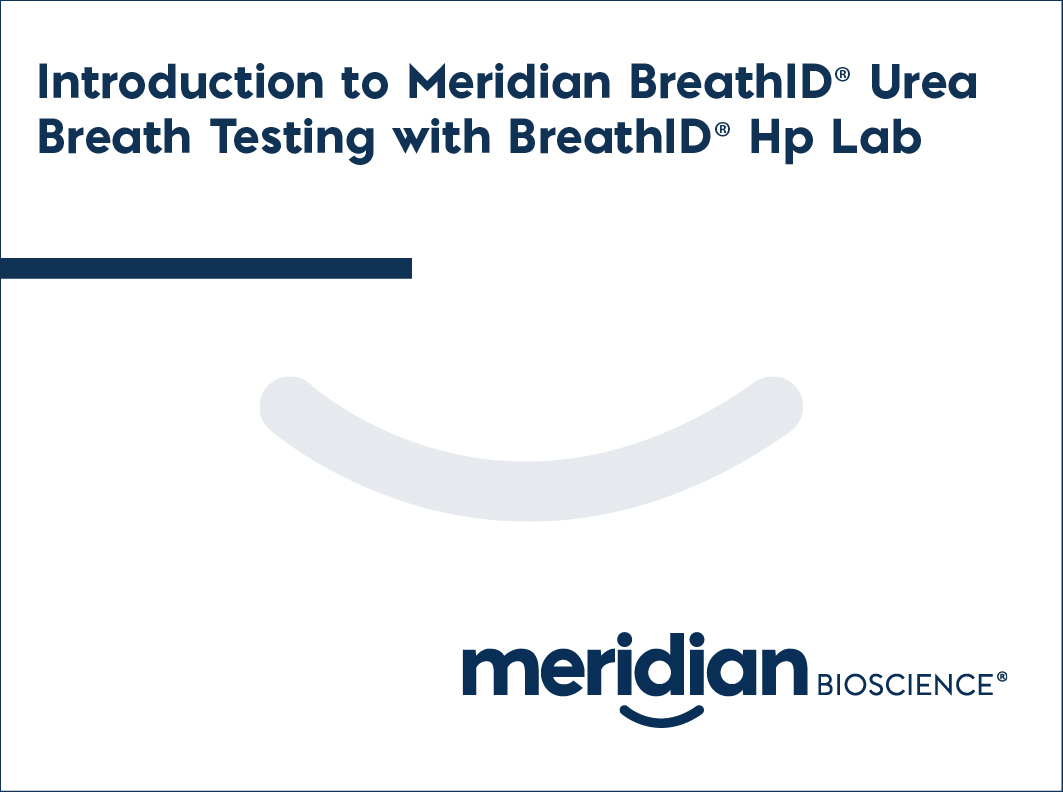
Introduction to Meridian Bioscience BreathID® Urea Breath Testing with BreathID® Hp Lab®
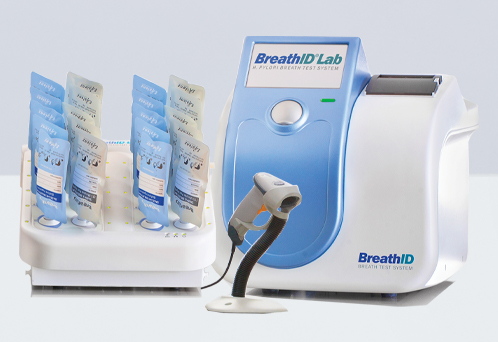
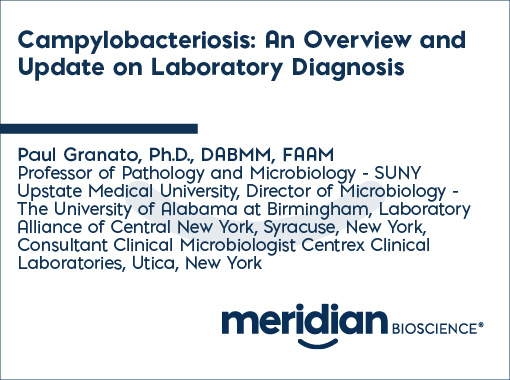
Paul Granato, Ph.D., DABMM, FAAM, presents comprehensive review of Campylobacter, including modes of transmission, symptoms, and virulence factors. This program will also discuss the advantages and disadvantages of the different test methods currently available.
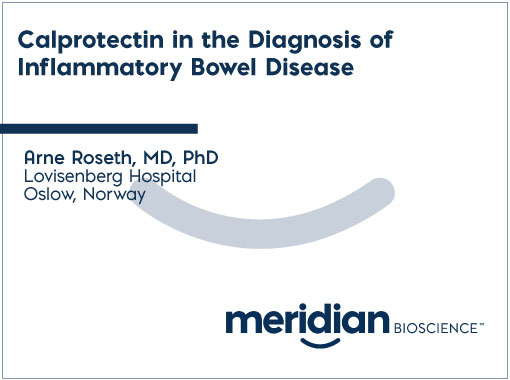
Calprotectin in the Diagnosis of Inflammatory Bowel Disease
Given the high prevalence of gastrointestinal disease, the value of calprotectin in IBD patient diagnosis, and the downfalls of traditional treatment pathways, it is clear that calprotectin testing is beneficial to patient care.
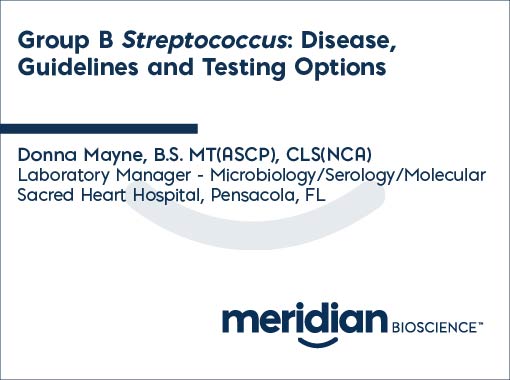
Group B Streptococcus: Disease, Guidelines, and Testing Options
Key opinion leader, Donna Mayne, B.S. (MT) ASCP, (CLS) NCA, presents on the topic of Group B Streptococcus. She discusses disease state, guidelines for testing and testing options.
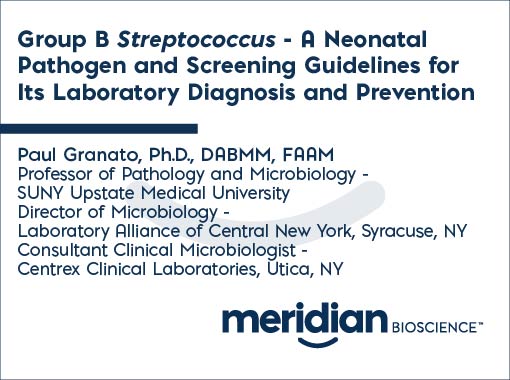
Group B Streptococcus – A Neonatal Pathogen and Screening Guidelines for Its Laboratory Diagnosis and Prevention
Group B Streptococcus continues to be the leading cause of morbidity and mortality in infants. This program will provide a comprehensive overview of this pathogen and the 2010 CDC guidelines that address diagnosis and prevention.
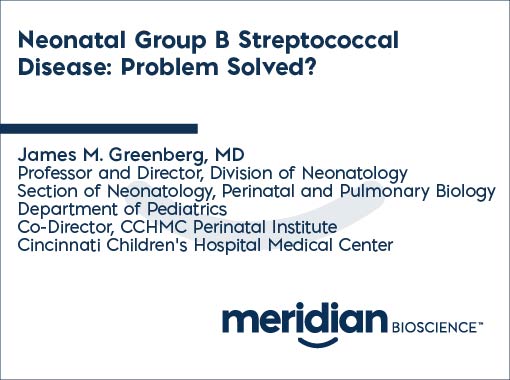
Neonatal Group B Streptococcal Disease: Problem Solved?
Key opinion leader, James M. Greenberg, MD Professor and Director, Division of Neonatology, Cincinnati Children’s Hospital Medical Center, presents on the topic of neonatal Group B Streptococcal disease. Group B Streptococcus continues to be the leading cause of morbidity and mortality in infants. This program will provide a comprehensive overview of this pathogen and the 2010 CDC guidelines that address diagnosis and prevention.
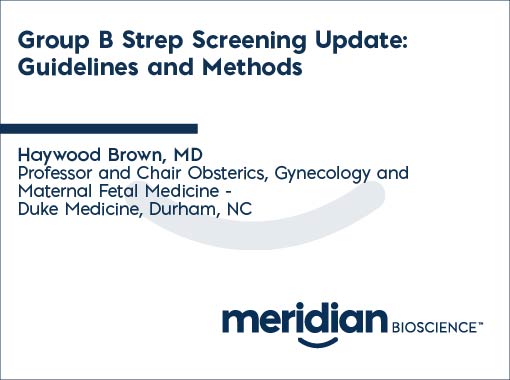
Group B Strep Screening Update: Guidelines and Methods
Key opinion leader, Haywood Brown, MD, Professor and Chair, Obstetrics, Gynecology and Maternal Fetal Medicine Duke Medicine, Durham, NC, presents on the topic of Group B Streptococcal disease. Group B Streptococcus continues to be the leading cause of morbidity and mortality in infants. This program will provide a comprehensive overview of this pathogen and the 2010 CDC guidelines that address diagnosis and prevention.
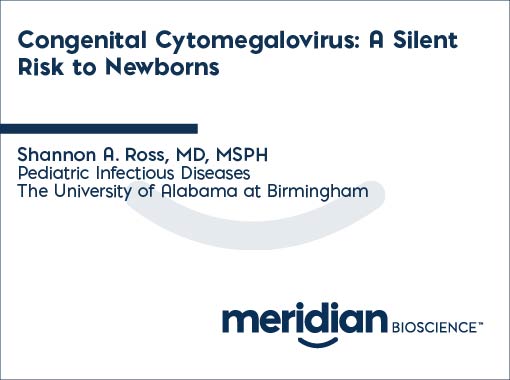
Congenital CMV – A Silent Risk to Newborns
The problem is much bigger than you think. 1 in 200 babies are born with Congenital Cytomegalovirus (cCMV). It is the leading cause of deafness in babies born in the United States. Of the 90% that are born asymptomatic, 43% will pass the hearing test even though they are infected with congenital CMV. This webinar will review the disease state of congenital CMV, including incidence, importance of early detection, diagnosis, and disease management which can impact patient outcome.
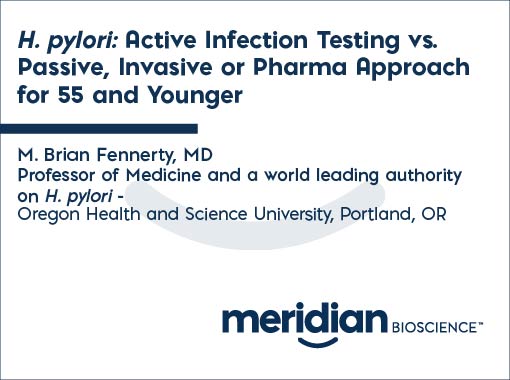
H. pylori: Active Infection Testing vs. Passive, Invasive or Pharma Approach for 55 and Younger
H. pylori key opinion leader, M. Brian Fennerty, MD, Professor of Medicine and a world leading authority on H. pylori presents on the topic of H. pylori to discuss active infection testing vs. passive, invasive or pharma approach for 55 and younger.
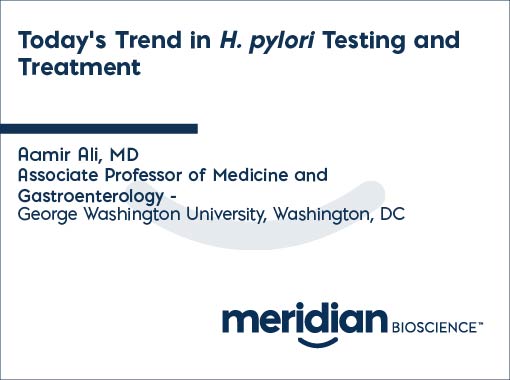
Today’s Trend in H. pylori Testing and Treatment
This program will provide a comprehensive overview of Helicobacter pylori diagnosis, the clinical impact to patients due to gaps in care and the benefits of utilizing an active infection test for H. pylori detection
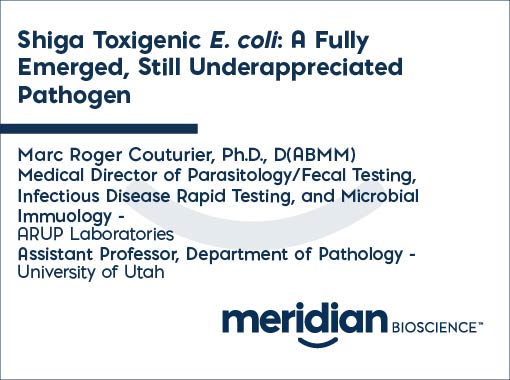
Shiga Toxigenic E. coli: A Fully Emerged, Still Underappreciated Pathogen
Key opinion leader, Marc Roger Couturier, Ph.D., D(ABMM), provides a comprehensive review of Shiga Toxigenic E. coli: A Fully Emerged, Still Underappreciated Pathogen
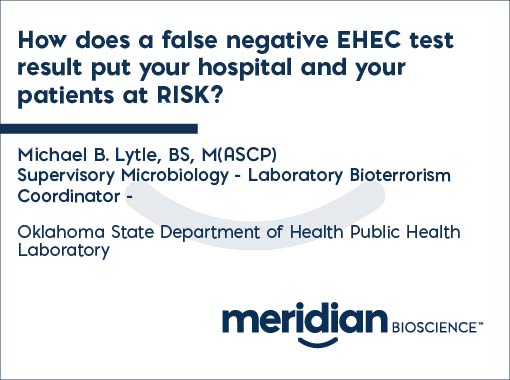
How does a False Negative EHEC test result put your hospital and your patients at RISK?
Key Opinion leader, Michael B. Lytle, BS, M(ASCP) provides a comprehensive overview of how a false negative EHEC test result puts your hospital and your patients at risk.
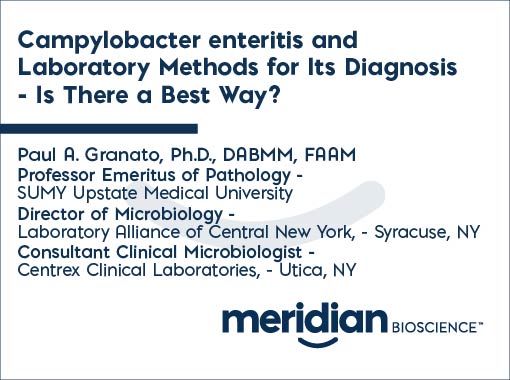
Campylobacter enteritis and Laboratory Methods for Its Diagnosis – Is There a Best Way?
Key Opinion Leader, Paul A. Granato, Ph.D., DABMM, FAAM provides a comprehensive review of Campylobacter Enteritisand Laboratory Methods for Its Diagnosis
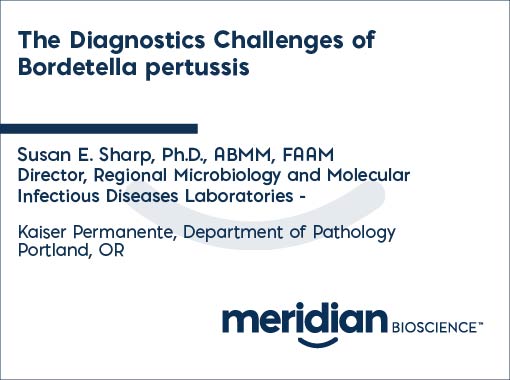
The Diagnostic Challenges of Bordetella pertussis
This program will provide a comprehensive overview of Bordetella pertussis and the benefits of molecular detection with Meridian’s molecular Pertussis assay.
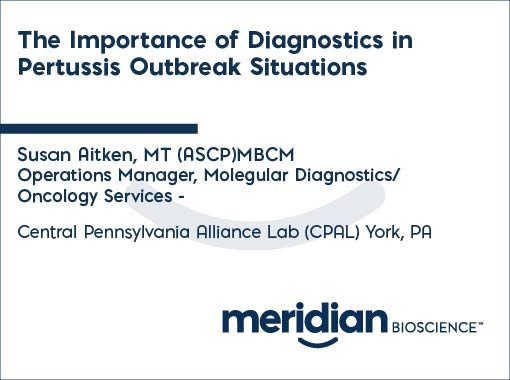
The Importance of Diagnostics in Pertussis Outbreak Situations
This program will provide a comprehensive overview of Bordetella pertussis and discuss the benefits of having molecular detection with Meridian’s Pertussis assay during a community outbreak situation.
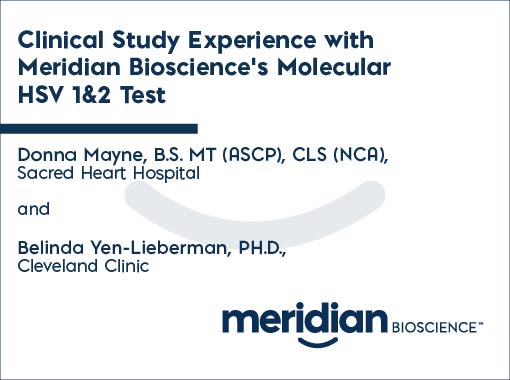
Clinical Study Experience with Meridian’s Molecular HSV 1&2 Test
Presenter Belinda Yen-Lieberman, Ph.D. and Donna Mayne, B.S. MT (ASCP), CLS (NCA) will discuss the performance of a loop-mediated isothermal amplification (LAMP) for the detection of HSV 1&2 compared with that of ELVIS in mucocutaneous and cutaneous swab specimens. Meridian’s HSV 1&2 assay provides highly sensitive and specific results in less than one hour to reduce turnaround time and eliminate the need for send-outs and viral culture.
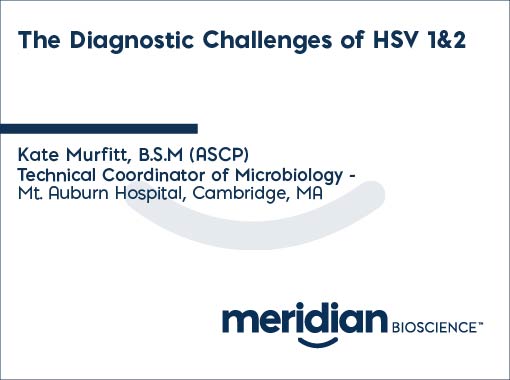
The Diagnostic Challenges of HSV 1&2
This program will provide information on Meridian’s HSV 1&2 test. It provides highly sensitive and specific results in less than one hour to reduce turnaround time and eliminate the need for send-outs and culture.
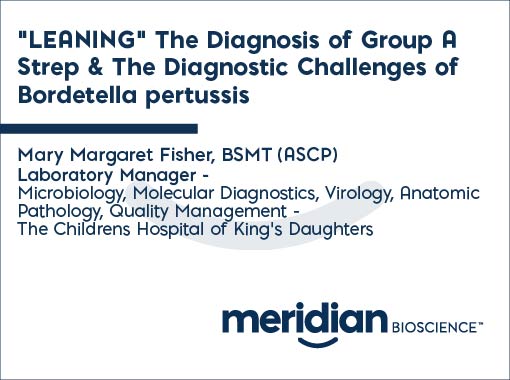
“LEANING” The Diagnosis Of Group A Strep & The Diagnostic Challenges of Bordetella pertussis
This program will provide a comprehensive overview of Group A Streptococcus & Bordetella pertussis and the benefits of molecular detection.
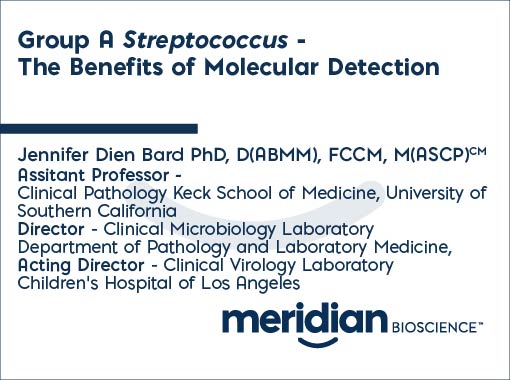
Group A Streptococcus – The Benefits of Molecular Detection
Presented by Jennifer Dien Bard, Ph.D., D(ABMM), FCCM discusses Group A Streptococcus continues to be the number one cause of acute bacterial pharyngitis. This program will provide a comprehensive overview of this pathogen and the benefits of molecular detection along with the 2012 IDSA Guidelines that address diagnosis and treatment.
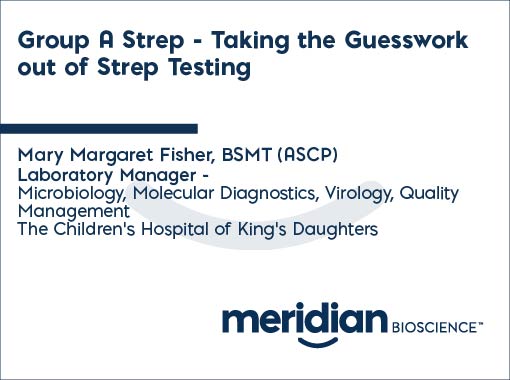
Group A Strep – Taking the Guesswork out of Strep Testing
This program will provide a comprehensive overview of Group A Streptococcus, the benefits of molecular detection, and how Alethia Group A Strep is the definitive solution for your strep testing needs.
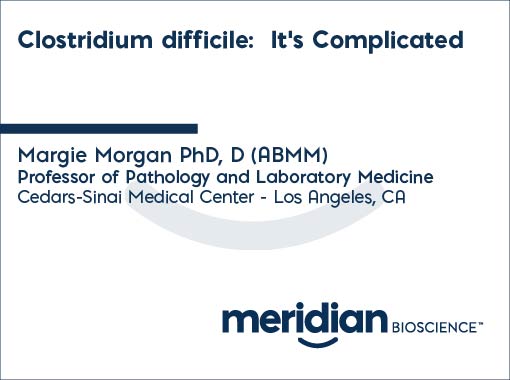
Clostridium difficile: It’s Complicated!
Presented by Margie Morgan, PhD D(ABMM), Professor of Pathology and Laboratory Medicine Cedars-Sinai Medical Center, Los Angeles, CA
Events
Connect with us and say hello! Check out our tradeshow and online events. We look forward to seeing and speaking with you.
